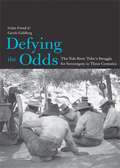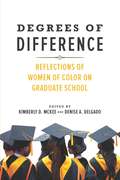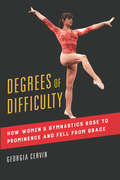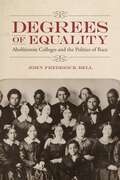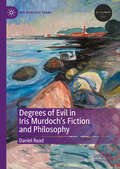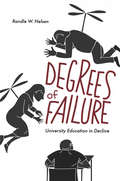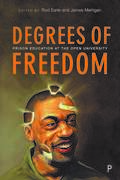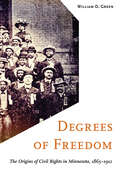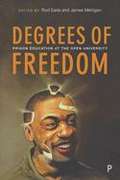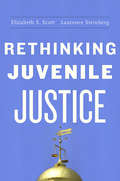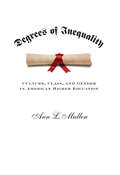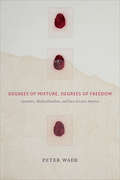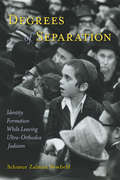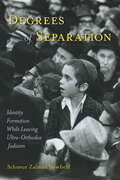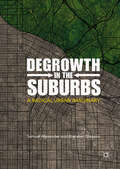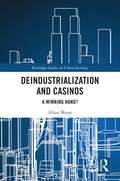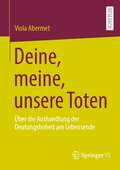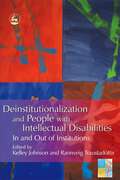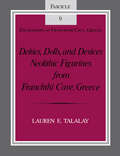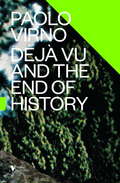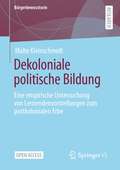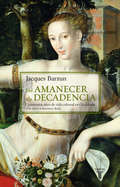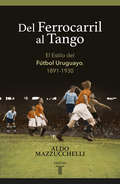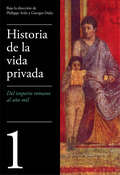- Table View
- List View
Defying the Odds: The Tule River Tribe's Struggle for Sovereignty in Three Centuries
by Gelya Frank Carole GoldbergAn anthropologist and a legal scholar combine expertise in this innovative book, deploying the history of one California tribe--the Tule River Tribe--in a definitive study of indigenous sovereignty from earliest contact through the current Indian gaming era.
Degrees of Difference: Reflections of Women of Color on Graduate School
by Kimberly D. McKee Denise A. Delgado Karen J. LeongUniversity commitments to diversity and inclusivity have yet to translate into support for women of color graduate students. Sexism, classism, homophobia, racial microaggressions, alienation, disillusionment, a lack of institutional and departmental support, limited help from family and partners, imposter syndrome, narrow reading lists—all remain commonplace. Indifference to the struggles of women of color in graduate school and widespread dismissal of their work further poisons an atmosphere that suffocates not only ambition but a person's quality of life. In Degrees of Difference, women of color from diverse backgrounds give frank, unapologetic accounts of their battles—both internal and external—to navigate grad school and fulfill their ambitions. At the same time, the authors offer strategies for surviving the grind via stories of their own hard-won successes with self-care, building supportive communities, finding like-minded mentors, and resisting racism and unsupportive faculty and colleagues. Contributors: Aeriel A. Ashlee, Denise A. Delgado, Nwadiogo I. Ejiogu, Delia Fernández, Regina Emily Idoate, Karen J. Leong, Kimberly D. McKee, Délice Mugabo, Carrie Sampson, Arianna Taboada, Jenny Heijun Wills, and Soha Youssef
Degrees of Difficulty: How Women's Gymnastics Rose to Prominence and Fell from Grace (Sport and Society #1)
by Georgia CervinHow the Cold War era changed the trajectory of women's gymnastics Electrifying athletes like Olga Korbut and Nadia Comăneci helped make women’s artistic gymnastics one of the most popular events in the Olympic Games. But the transition of gymnastics from a women’s sport to a girl’s sport in the 1970s also laid the foundation for a system of emotional, physical, and sexual abuse of gymnasts around the world. Georgia Cervin offers a unique history of women's gymnastics, examining how the high-stakes diplomatic rivalry of the Cold War created a breeding ground for exploitation. Yet, a surprising spirit of international collaboration arose to decide the social values and image of femininity demonstrated by the sport. Cervin also charts the changes in style, equipment, training, and participants that transformed the sport, as explosive athleticism replaced balletic grace and gymnastics dominance shifted from East to West. Sweeping and revelatory, Degrees of Difficulty tells a story of international friction, unexpected cooperation, and the legacy of abuse and betrayal created by the win-at-all-cost attitudes of the Cold War.
Degrees of Equality: Abolitionist Colleges and the Politics of Race
by John Frederick BellThe abolitionist movement not only helped bring an end to slavery in the United States but also inspired the large-scale admission of African Americans to the country’s colleges and universities. Oberlin College changed the face of American higher education in 1835 when it began enrolling students irrespective of race and sex. Camaraderie among races flourished at the Ohio institution and at two other leading abolitionist colleges, Berea in Kentucky and New York Central, where Black and white students allied in the fight for emancipation and civil rights. After Reconstruction, however, color lines emerged on even the most progressive campuses. For new generations of white students and faculty, ideas of fairness toward African Americans rarely extended beyond tolerating their presence in the classroom, and overt acts of racial discrimination grew increasingly common by the 1880s.John Frederick Bell’s Degrees of Equality analyzes the trajectory of interracial reform at Oberlin, New York Central, and Berea, noting its implications for the progress of racial justice in both the nineteenth and twenty-first centuries. Drawing on student and alumni writings, institutional records, and promotional materials, Bell interrogates how abolitionists and their successors put their principles into practice. The ultimate failure of these social experiments illustrates a tragic irony of abolitionism, as the achievement of African American freedom and citizenship led whites to divest from the project of racial pluralism.
Degrees of Evil in Iris Murdoch's Fiction and Philosophy (Iris Murdoch Today)
by Daniel ReadThis is the first survey of Murdoch’s exploration of evil, addressing aesthetic, philosophical, political and theological perspectives. The study demonstrates how her work engages with currently urgent issues of trauma, terrorism and psychopathy and brings her works into dialogue with key figures in twentieth- and twenty-first-century discussions of evil, including Hannah Arendt, Carl Gustav Jung, Susan Neiman and Simone Weil. These resonances are traced through close readings of Murdoch’s published fiction and philosophy in combination with unpublished texts, including annotations, interviews and letters. Murdoch’s detailed and nuanced portrayal of evil invites readers to explore the complexities of human behaviour and the potential for moral failure.
Degrees of Failure: University Education in Decline
by Randle W. NelsenIn Degrees of Failure, Randle Nelsen brings together such diverse topics as campus parking, college sports, helicopter parents, edu-business as edu-tainment, and technology in teaching to show how continuing inequities, grounded in large part upon social class differences, are maintained and reproduced in our universities. Paying special attention to the role played by professors in solidifying status quo arrangements, Nelsen makes the strange familiar for those outside the university bureaucracy and the familiar strange for those whose participation in university settings is a routine part of everyday life.
Degrees of Freedom: Prison Education at The Open University
by Rod Earle James MehiganThe first authoritative volume to look back on the last 40 years of The Open University providing higher education to those in prison, this unique book gives voice to ex-prisoners whose lives have been transformed by the education they received. Offering vivid personal testimonies, reflective vignettes and academic analysis of prison life and education in prison, the book will mark the 50th anniversary of Open University.
Degrees of Freedom: The Origins of Civil Rights in Minnesota, 1865–1912
by William D. GreenThe true story, and the black citizens, behind the evolution of racial equality in Minnesota He had just given a rousing speech to a packed assembly in St. Paul, but Frederick Douglass, confidant to the Great Emancipator and conscience of the Republican Party, was denied a hotel room because he was black. This was Minnesota in 1873, four years after the state had approved black suffrage—a state where &“freedom&” meant being unshackled from slavery but not social restrictions, where &“equality&” meant access to the ballot but not to a restaurant downtown. Spanning the half-century after the Civil War, Degrees of Freedom draws a rare picture of black experience in a northern state and of the nature of black discontent and action within a predominantly white, ostensibly progressive society. William D. Green reveals little-known historical characters among the black men and women who moved to Minnesota following the Fifteenth Amendment; worked as farmhands and laborers; built communities (such as Pig&’s Eye Landing, later renamed St. Paul), businesses, and a newspaper (the Western Appeal); and embodied the slow but inexorable advancement of race relations in the state over time. Within this absorbing, often surprising, narrative we meet &“ordinary&” citizens, like former slave and early settler Jim Thompson and black barbers catering to a white clientele, but also personages of national stature, such as Frederick Douglass, Booker T. Washington, and W. E. B. Du Bois, all of whom championed civil rights in Minnesota. And we see how, in a state where racial prejudice and oppression wore a liberal mask, black settlers and entrepreneurs, politicians, and activists maneuvered within a restricted political arena to bring about real and lasting change.
Degrees of Freedom: Prison Education at the Open University
by James Mehigan Rod EarleThe first authoritative volume to look back on the last 40 years of The Open University providing higher education to those in prison, this unique book gives voice to ex-prisoners whose lives have been transformed by the education they received. <P><P>Offering vivid personal testimonies, reflective vignettes and academic analysis of prison life and education in prison, the book will mark the 50th anniversary of Open University.
Degrees of Freedom: Louisiana and Cuba after Slavery
by Rebecca J. Scott Laurence D SteinbergAs Louisiana and Cuba emerged from slavery in the late nineteenth century, each faced the question of what rights former slaves could claim. Degrees of Freedom compares and contrasts these two societies in which slavery was destroyed by war, and citizenship was redefined through social and political upheaval. Both Louisiana and Cuba were rich in sugar plantations that depended on an enslaved labor force. After abolition, on both sides of the Gulf of Mexico, ordinary people-cane cutters and cigar workers, laundresses and labor organizers-forged alliances to protect and expand the freedoms they had won. But by the beginning of the twentieth century, Louisiana and Cuba diverged sharply in the meanings attributed to race and color in public life, and in the boundaries placed on citizenship. Louisiana had taken the path of disenfranchisement and state-mandated racial segregation; Cuba had enacted universal manhood suffrage and had seen the emergence of a transracial conception of the nation. What might explain these differences? Moving through the cane fields, small farms, and cities of Louisiana and Cuba, Rebecca Scott skillfully observes the people, places, legislation, and leadership that shaped how these societies adjusted to the abolition of slavery. The two distinctive worlds also come together, as Cuban exiles take refuge in New Orleans in the 1880s, and black soldiers from Louisiana garrison small towns in eastern Cuba during the 1899 U.S. military occupation. Crafting her narrative from the words and deeds of the actors themselves, Scott brings to life the historical drama of race and citizenship in postemancipation societies.
Degrees of Inequality: Culture, Class, and Gender in American Higher Education
by Ann L. Mullen2011 Educator's Award. Delta Kappa Gamma Society International2011 Outstanding Publication in Postsecondary Education, American Educational Research Association, Division JDegrees of Inequality reveals the powerful patterns of social inequality in American higher education by analyzing how the social background of students shapes nearly every facet of the college experience. Even as the most prestigious institutions claim to open their doors to students from diverse backgrounds, class disparities remain. Just two miles apart stand two institutions that represent the stark class contrast in American higher education. Yale, an elite Ivy League university, boasts accomplished alumni, including national and world leaders in business and politics. Southern Connecticut State University graduates mostly commuter students seeking credential degrees in fields with good job prospects. Ann L. Mullen interviewed students from both universities and found that their college choices and experiences were strongly linked to social background and gender. Yale students, most having generations of family members with college degrees, are encouraged to approach their college years as an opportunity for intellectual and personal enrichment. Southern students, however, perceive a college degree as a path to a better career, and many work full- or part-time jobs to help fund their education.Moving interviews with 100 students at the two institutions highlight how American higher education reinforces the same inequities it has been aiming to transcend.
Degrees of Mixture, Degrees of Freedom: Genomics, Multiculturalism, and Race in Latin America
by Peter WadeRace mixture, or mestizaje, has played a critical role in the history, culture, and politics of Latin America. In Degrees of Mixture, Degrees of Freedom, Peter Wade draws on a multidisciplinary research study in Mexico, Brazil, and Colombia. He shows how Latin American elites and outside observers have emphasized mixture's democratizing potential, depicting it as a useful resource for addressing problems of racism (claiming that race mixture undoes racial difference and hierarchy), while Latin American scientists participate in this narrative with claims that genetic studies of mestizos can help isolate genetic contributors to diabetes and obesity and improve health for all. Wade argues that, in the process, genomics produces biologized versions of racialized difference within the nation and the region, but a comparative approach nuances the simple idea that highly racialized societies give rise to highly racialized genomics. Wade examines the tensions between mixture and purity, and between equality and hierarchy in liberal political orders, exploring how ideas and scientific data about genetic mixture are produced and circulate through complex networks.
Degrees of Separation: Identity Formation While Leaving Ultra-Orthodox Judaism
by Schneur Zalman NewfieldThose who exit a religion—particularly one they were born and raised in—often find themselves at sea in their efforts to transition to life beyond their community. In Degrees of Separation, Schneur Zalman Newfield, who went through this process himself, interviews seventy-four Lubavitch and Satmar ultra-Orthodox Hasidic Jews who left their communities.He presents their motivations for leaving as well as how they make sense of their experiences and their processes of exiting, detailing their attitudes and opinions regarding their religious upbringing. Newfield also examines how these exiters forge new ways of being that their upbringing had not prepared them for, while also considering what these particular individuals lose and retain in the exit process. Degrees of Separation presents a comprehensive portrait of the prolonged state of being “in-between” that characterizes transition out of a totalizing worldview. What Newfield discovers is that exiters experience both a sense of independence and a persistent connection; they are not completely dislocated from their roots once they “arrive” at their new destination. Moreover, Degrees of Separation shows that this process of transitioning identity has implications beyond religion.
Degrees of Separation: Identity Formation While Leaving Ultra-Orthodox Judaism
by Schneur Zalman NewfieldThose who exit a religion—particularly one they were born and raised in—often find themselves at sea in their efforts to transition to life beyond their community. In Degrees of Separation, Schneur Zalman Newfield, who went through this process himself, interviews seventy-four Lubavitch and Satmar ultra-Orthodox Hasidic Jews who left their communities.He presents their motivations for leaving as well as how they make sense of their experiences and their processes of exiting, detailing their attitudes and opinions regarding their religious upbringing. Newfield also examines how these exiters forge new ways of being that their upbringing had not prepared them for, while also considering what these particular individuals lose and retain in the exit process. Degrees of Separation presents a comprehensive portrait of the prolonged state of being “in-between” that characterizes transition out of a totalizing worldview. What Newfield discovers is that exiters experience both a sense of independence and a persistent connection; they are not completely dislocated from their roots once they “arrive” at their new destination. Moreover, Degrees of Separation shows that this process of transitioning identity has implications beyond religion.
Degrowth in the Suburbs: A Radical Urban Imaginary
by Samuel Alexander Brendan GleesonThis book addresses a central dilemma of the urban age: how to make the vast suburban landscapes that ring the globe safe and sustainable in the face of planetary ecological crisis. The authors argue that degrowth, a planned contraction of economic overshoot, is the only feasible principle for suburban renewal. They depart from the anti-suburban sentiment of much environmentalism to show that existing suburbia can be the centre-ground of transition to a new social dispensation based on the principle of self-limitation. The book offers a radical new urban imaginary, that of degrowth suburbia, which can arise Phoenix like from the increasingly stressed cities of the affluent Global North and guide urbanisation in a world at risk. This means dispensing with much contemporary green thinking, including blind faith in electric vehicles and high-density urbanism, and accepting the inevitability and the benefits of planned energy descent. A radical but necessary vision for the times.
Deindustrialisation in Twentieth-Century Europe: The Northwest of Italy and the Ruhr Region in Comparison (Palgrave Studies in the History of Social Movements)
by Stefan Berger Stefano Musso Christian WickeExploring two large economies which were heavily affected by deindustrialisation in the late twentieth century, this book provides insights into the social movements that brought about and also challenged industrial reduction in Europe. Both the Ruhr region in Germany and the Northwest of Italy experienced major structural transformation from the 1960s as a result of deindustrialisation. With contributions from experts in the field, this collection provides a comparative overview of each region, examining policy implementation, class relations, the changing political economy and environmental impact. Analysing industrial and post-industrial landscapes, urban developments and labour relations, the authors place their transnational findings within the context of the wider literature on deindustrialisation in the global North. A much-needed contribution to deindustrialisation studies, which have traditionally focused on North America and the UK, this book is a useful read for those researching deindustrialisation and the social history of Europe.
Deindustrialization and Casinos: A Winning Hand? (Routledge Studies in Urban Sociology)
by Alissa MazarAs governments increasingly legalize and expand the availability of casinos, hoping to offset the impacts of manufacturing decline through the advancement of gambling commerce, this book examines what casinos do—and do not do—for host communities in terms of economic growth. Examining the case generally made by those seeking to establish casino developments—that they offer benefits for the "public good"—the author draws on a case study of Canada’s automotive capital (Windsor, Ontario), which was a pilot site for potential further casino development in the region. The author asks whether casinos do, in fact, offer good jobs, revenue generation, and economic diversification. A study of the benefits of casino developments that considers the question of whether they constitute a ready answer to the problems of industrial and economic decline, this volume will appeal to scholars of sociology and urban studies, with interests in the gambling industry, economic sociology, the sociology of work, and urban regeneration.
Deine, meine, unsere Toten: Über die Aushandlung der Deutungshoheit am Lebensende
by Viola AbermetIn der modernen Dienstleistungsgesellschaft werden spezielle wie alltägliche Aufgaben in die Hände von Dienstleistenden übergeben. Gerade im Bereich des Sterbens entsteht die Herausforderung, eine besonders emotionale und sensible Arbeit verrichten zu müssen, in einem der letzten Bereiche, die noch stark mit Familie assoziiert werden. So schließt sich die Frage an, wie dem Übel der Kommodifizierung des Sterbens in der Praxis begegnet wird: Wer darf wie über Tod und Sterben entscheiden? In teilnehmender Beobachtung im Pflegeheim, Hospiz, Bestattungswesen, Friedhof, Krematorium und Palliative Care Team wird der Frage nachgegangen, wie am Lebensende im Beziehungskomplex von Dienstleistenden, Sterbenden und Angehörigen die Deutungshoheit des angemessenen Sterbens ausgehandelt wird. Zu sehen ist ein pragmatisches Spiel mit Elementen der Fürsorge- und Dienstleistungswelten, das ein komplexes und dynamisches Beziehungsgefüge wechselseitiger Dependenzen entstehen lässt.
Deinstitutionalization and People with Intellectual Disabilities: In and Out of Institutions
by Kristjana Kristiansen Christine M Bigby Kelley Johnson Rannveig TraustadottirThis international collection of personal and professional perspectives takes a fresh look at deinstitutionalization. It addresses the key steps towards deinstitutionalization as they have been experienced by people with intellectual disabilities: living inside total institutions, moving out, living in the community and moving on to new forms of both institutionalization and community life. Many of the chapters are contributions from people with intellectual disabilities. They are based on a life history approach and give a unique personal account of the lived experiences of institutional life and deinstitutionalization by the people who were subject to it. The life story of Tom Allen (19Â12-1991) is interspersed throughout the book, providing a powerful testimony of the way institutions and deinstitutionalization have affected one individual over the course of almost a century. Researchers and practitioners will find this book an insightful and accessible reflection on deinstitutionalization, and a source of encouragement for improving the lives of people with intellectual disabilities.
Deities, Dolls, and Devices: Neolithic Figurines From Franchthi Cave, Greece (Excavations at Franchthi Cave, Greece #9)
by Lauren E. TalalayA report on the prehistoric ceramic figurines recovered from the Franchthi Cave in Greece.Talalay reports on a small body of figurines (twenty-four figurines and twenty-one fragments) recovered during excavations at Franchthi Cave and at the nearby open-air settlement along the present shoreline. She also reexamines the theoretical and methodological foundations of scholarship in the field of figurine studies. A thorough and pathfinding study of the most important body of figurines from southern Greece, this book will be especially valuable to specialists in prehistoric Greece and to all scholars interested in early representations of the human figure in prehistoric art and in the significance of these representations to the members of early human communities. The book also makes a contribution to the growing body of literature on gender in early societies with a critical evaluation of the uses of evidence in addressing gender issues.
Deja Vu and the End of History
by Paolo Virno David BroderDéjà vu, which doubles and confuses our experience of time, is a psychological phenomenon with peculiar relevance to our contemporary historical circumstances. From this starting point, the acclaimed Italian philosopher Paolo Virno examines the construct of memory, the passage of time, and the "end of history." Through thinkers such as Bergson, Kojève and Nietzsche, Virno shows how our perception of history can become suspended or paralysed, making the distinction between "before" and "after," cause and effect, seem derisory. In examining the way the experience of time becomes historical, Virno forms a radical new theory of historical temporality.From the Trade Paperback edition.
Dekoloniale politische Bildung: Eine empirische Untersuchung von Lernendenvorstellungen zum postkolonialen Erbe (Bürgerbewusstsein)
by Malte KleinschmidtIn diesem Open-Access-Buch setzt sich Malte Kleinschmidt mit der Frage auseinander, wie politische Bildung zu einer Dekolonisierung beitragen kann. Nicht erst durch die Auseinandersetzungen um Black Lives Matter wird deutlich, dass Rassismus und Kolonialität nicht als Phänomene der Vergangenheit abgetan werden können. Anhand von der Analyse von 44 Interviews mit Schüler_innen von 9. Klassen an Hauptschulen und Gymnasien wird herausgearbeitet, wie diese Phänomene die Lebenswelt der Schüler_innen prägen. In den subjektiven Sinnbildungen der Lernenden werden zum einen koloniale Muster reproduziert, sie aber zum anderen auch massiv infrage gestellt. Diese Vorstellungen dienen als Ausgangspunkt, um dekoloniale Impulse für eine radikaldemokratisch verstandene politische Bildung zu entwickeln. Vor diesem Hintergrund diskutiert Malte Kleinschmidt dekoloniale didaktische Strategien in Bezug auf den erinnerungspolitischen Umgang mit dem historischen Kolonialismus, die koloniale Globalität der Gegenwart, die Verwerfungen des natio-ethno-kulturellen Zugehörigkeitsregimes sowie epistemische Ordnungen der Kolonialität.
Del amanecer a la decadencia: Quinientos años de vida cultural en Occidente (De 1500 a nuestros días)
by Jacques BarzunLa obra cumbre del historiador Jacques Barzun es una magnífica síntesis de nuestra historia moderna: un apasionante recorrido de Occidente desde el Renacimiento y la Reforma hasta nuestros días. El historiador Jacques Barzun, reconocido internacionalmente por sus más de treinta obras sobre historia y crítica cultural, nos ofrece sus descubrimientos y conclusiones sobre toda la cultura de Occidente desde 1500. Describe la forja del hombre occidental desde el Renacimiento y la Reforma hasta el presente, bajo una doble luz: la de aquellos tiempos y la de nuestros actuales intereses. Los triunfos y derrotas ocurridos en estos quinientos años confirman una inspirada saga que modifica la visión de este periodo como una época de opresión por parte de los hombres blancos europeos. Las mujeres y sus proezas son sobresalientes, y la libertad (incluso la sexual) no es un invento de las últimas décadas. Y cuando Barzun valora el presente como declive y no como culminación, no lo hace como un profeta apocalíptico. Por el contario, muestra que la decadencia es el cierre inevitable de las grandes épocas, condición necesaria para la creación de la novedad, que surgirá pronto, tal vez mañana. La crítica ha dicho...«Sin duda alguna, este libro sobrevivirá para deleitar y provocar a los lectores del siglo XXI; incluso asombrara a los del siglo XXII por su preclaridad.»The New York Times Book Review «Este libro pasará a la Historia... Supone el triunfo de la sabiduría sin ataduras.»Newsweek «¿Cuántas veces en la vida se encuentra uno frente a una obra maestra? Esta obra, sin ninguna duda, lo es.»National Review
Del ferrocarril al tango: El Estilo del Fútbol Uruguayo, 1891-1930
by Aldo MazzucchelliEste parece un ensayo sobre fútbol, pero en realidad versa sobre las necesarias correcciones a la mitología nacional. Se abre así la posibilidad de rescatar otra historia acerca de lo que caracterizó tanto a Uruguay como nación en los veinte, como al fútbol uruguayo en los tiempos en que ganó tres de las cuatro estrellas que aún luce en su camisa celeste. ¿Qué inventó el fútbol uruguayo que lo hizo ganador y hegemónico en el mundo durante algunas décadas? ¿Cómo una docena de encumbrados políticos lo fueron incorporando a la identidad nacional de una sociedad de inmigrantes hace cien años, creando una épica que vertebró el imaginario de un país exitoso? ¿Cómo se fue entretejiendo el portentoso desarrollo de la ciudad, el recorrido de los tranvías y las plazas de deportes, con el surgimiento de los clubes de fútbol? ¿Cómo simultáneamente se dio el proceso de democratización de los clubes grandes, acompañando el proceso de la sociedad? ¿Cómo fueron los partidos decisivos de los tres campeonatos mundiales ganados en seis años? Cuando Uruguay realmente ganaba mundiales de fútbol, era un equipo proponedor, veloz, preciso, gambeteador y de cuidado toque de balón a ras del suelo. ¿Cómo se puede afirmar esto? Es muy fácil. Basta con ir y leer la abrumadora cantidad de testimonios y comentarios imparciales, generados por los especialistas europeos y por la abundante prensa regional. En este libro están las pruebas. Pero una vez que un mito se ha instalado, se vuelve conservador y se traiciona a sí mismo. Así los uruguayos han olvidado que ganaron con excelencia y creen que lo hicieron con «garra charrúa» y, por qué no, con juego sucio. Este libro argumenta que tal reducción de aquel lujoso fútbol, «científico y artístico» a la vez, al mero concepto de «garra», fue una maniobra de revisionismo histórico impulsada en los años 60. Coincidió con la crisis cultural del país, y resultó una simplificación tardía y empobrecedora.
Del Imperio Romano al año mil (Historia de la vida privada #Volumen 1)
by Philippe ArièsDel Imperio Romano al año mil es el primer tomo del monumental estudio «Historia de la vida privada». <P><P>Dividida en cinco volúmenes, esta Historia de la vida privada aborda más de dos mil años de historia y se extiende desde la Europa del Norte hasta el Mediterráneo, y su hilo conductor consiste en hacer perceptibles los cambios, lentos o precipitados, que, al filo de las épocas, han afectado a la noción y los aspectos de la vida privada, ese lugar familiar, doméstico, secreto, en el que se encuentra encerrado lo que poseemos de más precioso, lo que solo le pertenece a uno mismo, lo que no concierne a los demás. <P> Los mejores especialistas de cada periodo analizan ese mundo privado en movimiento: de la domus latina al apartamento burgués, asistimos a las constantes mutaciones del hogar, reflejo del horizonte mental de cada época. Vida familiar, trabajo, ocio, hábitat, comida... Esta obra monumental llega hasta los albores de la era del ordenador y el teléfono móvil.
